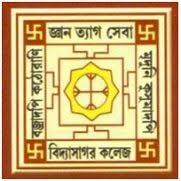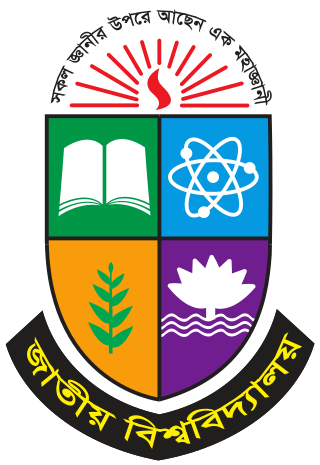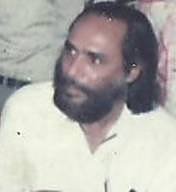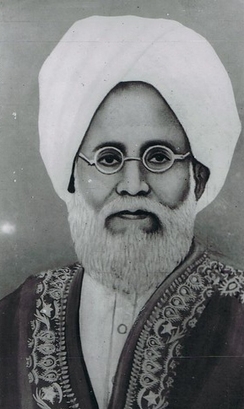
Shibli Nomani was an Indian Islamic scholar, poet, philosopher, historian, educational thinker, author, orator, reformer and critic of orientalists during the British Raj. He is regarded as the father of Urdu historiography. He was also proficient in Arabic and Persian languages. Shibli was associated with two influential movements in the region, the Aligarh and the Nadwa movements. As a supporter of the Deobandi school, he believed that English language and European sciences should be incorporated into the education system. Shibli wrote several biographies of Muslim heroes, convinced that Muslims of his time could learn valuable lessons from the past. His synthesis of past and modern ideas contributed significantly to Islamic literature produced in Urdu between 1910 and 1935. Shibli established the Darul Musannefin Shibli Academy in 1914 to promote Islamic scholarship and also founded the Shibli National College in 1883. He collected much material on the life of Muhammad, and completed the first two volumes of the planned work, Sirat al-Nabi. His disciple, Sulaiman Nadvi, added to this material and wrote the remaining five volumes after Shibli's death.

Vidyasagar University is a public research university that was established by an Act of the West Bengal legislature which was notified in the Calcutta Gazette on 24 June 1981. It is an affiliating university in Paschim Medinipur district of southern West Bengal, India. It offers courses at the undergraduate and post-graduate levels.

SirZiauddin Ahmad was an Indian mathematician, parliamentarian, logician, natural philosopher, politician, political theorist, educationist and a scholar. He was a member of the Aligarh Movement and was a professor, principal of MAO College, first pro vice-chancellor, vice chancellor and rector of Aligarh Muslim University, India.

Vidyasagar College is a state government-aided public college, affiliated to the University of Calcutta, located in North Kolkata, West Bengal, India. The college offers both post-graduate and under-graduate courses in a number of subjects of arts and science. Founded in 1872, it was the first private college in India which was purely run, maintained and financed by Indians. Formerly known as Metropolitan Institution, it was named after its founder Pandit Ishwar Chandra Vidyasagar in 1917.

St. Edmund's College, often abbreviated as SEC, is an educational institute of the Congregation of Christian Brothers located in Shillong, Meghalaya, India. It is the oldest college in Meghalaya and second oldest in Northeast India behind Cotton College, Guwahati (1901). It was established in 1924 and celebrated its Platinum Jubilee in 1999. An alumnus of St. Edmund's College, Shillong or St. Edmund's School, Shillong is often called an Edmundian.

Maulvi Abdul Haq was a scholar and a linguist, who some call Baba-e-Urdu, was a scholar and linguist of the Urdu language. The main credit for the development and promotion of Urdu language in 20th century goes to him, because he devoted his entire life to Urdu, and also demanded for it to be made the national language of Pakistan.

Anjuman-i Taraqqi-i Urdu was an organisation working for the promotion and dissemination of Urdu language, literature and culture in British India.
Women's Institute of Science and Humanities (WISH) is an institute of higher learning for women in H-8, Islamabad, Pakistan.

DDU Gorakhpur University is located in Gorakhpur, Uttar Pradesh. The University of Gorakhpur is a teaching and residential-cum-affiliating University. It has entered the league of top five state universities of the country by achieving NAAC Grade A++ rank. It has become the first university of the state to get a 3.78 score. It is about two kilometres (1.2 mi). from the downtown to the east and almost walking distance from railway station to the south.

National University is a public collegiate university of Bangladesh that was established in 1992 by an Act of Parliament as an affiliating university of the country to impart graduate and post-graduate level education to students through its affiliated colleges, schools and professional institutions throughout the country. The number of colleges under the NU is 2,257. Among these, 555 are government colleges. A total of 881 colleges offer honors courses. It is the Second largest university in the world in terms of enrollment. The headquarters is in Gazipur, on the outskirts of Dhaka. After its establishment, the university began affiliating with association degree-awarding colleges, many of which were previously affiliated with the University of Dhaka, University of Rajshahi, University of Chittagong and Shahjalal University of Science and Technology.

Lucknow Christian College is a graduate and post-graduate college located in Golaganj, Lucknow, Uttar Pradesh, India. It is affiliated with the University of Lucknow.

Government National College, Karachi is a college in Karachi, Pakistan.

Kurigram Government College, located at the centre of Kurigram District headquarters is the only honors college in the district. It is also one of the famous colleges of northern Bangladesh. It offers HSC, three-year Bachelor and four-year Honors courses. The college is affiliated to the National University. Several thousand students study here. The college has two academic buildings and two hostels, one for male and the other for female students.

Israr Ahmad was an Indian theoretical nuclear physicist and professor at Aligarh Muslim University since 1961. He was known for his work in quantum scattering theory.

Bareilly College, Bareilly (BCB) is an institution located in the metropolis of Bareilly in the Indian state of Uttar Pradesh. The college is affiliated with the Mahatma Jyotiba Phule Rohilkhand University, and has been affiliated with the Agra University and Allahabad University before the establishment of Rohilkhand University. It was established during the reign British Empire in 1837.
Iqbal Ahmed Khan was born in 1884 in village Badhariya, Azamgarh, and died on 7 November 1955 and his ancestors belongs to a Village name Ledrahi (Jaunpur). He was a famous Urdu poet, writing under the takhallus, or pen name "Suhail", Islamic scholar, lawyer, educationist and a politician. He was a member of the executive committee of the Azamgarh Muslim Education Society, which manages Shibli National Post Graduate College and other institutions in Azamgarh, Uttar Pradesh. His poetry has been mentioned in many articles about Azamgarh. His work has been featured in the Encyclopedic Dictionary of Urdu Literature. edited by.

Aligarh Muslim University is a collegiate, central, and research university located in Aligarh, Uttar Pradesh, India, which was originally established by Sir Syed Ahmad Khan as the Muhammadan Anglo-Oriental College in 1875. Muhammadan Anglo-Oriental College became Aligarh Muslim University in 1920, following the Aligarh Muslim University Act.
The Aligarh Movement was the push to establish a modern system of Western-style scientific education for the Muslim population of British Raj, during the later decades of the 19th century. The movement's name derives from the fact that its core and origins lay in the city of Aligarh in Central India and, in particular, with the foundation of the Muhammadan Anglo-Oriental College in 1875. The founder of the oriental college, and the other educational institutions that developed from it, was Sir Syed Ahmed Khan. He became the leading light of the wider Aligarh Movement.
The Faculty of Law, Aligarh Muslim University is the law school of the Aligarh Muslim University which has a history of over 100 years of teaching and writing law. Law classes were inaugurated by Justice Douglas Straight on December 29, 1891.

This bibliography of Shibli Nomani is a selected list of generally available scholarly resources related to Shibli Nomani, a poet, philosopher, historian, educational thinker, author, orator, reformer, critic of orientalists and Islamic scholar from the Indian subcontinent during the British Raj, regarded as the father of Urdu historiography. His disciple Sulaiman Nadvi wrote his biography, Hayat-e-Shibli, in 1943. This list will include his biographies, theses written on him and articles published about him in various journals, newspapers, encyclopedias, seminars, websites, etcetera in APA style.
















